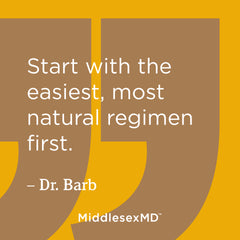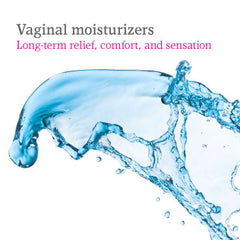This is the second post in our occasional survey inspired by the results of a survey we co-sponsored with PrevaLeaf, makers of natural products for intimate wellness. You can read our first post here: You spoke. We’re listening.
 Almost every day, I see patients who suffer, and I mean suffer, from vaginal dryness due to menopause or surgically induced menopause, such as hysterectomy. In medical parlance, the umbrella term for vaginal pain is dyspareunia, and the term for dry, brittle vaginal tissue is now “genitourinary syndrome of menopause," just so you know (it’s been called vulvovaginal atrophy until recently).
Almost every day, I see patients who suffer, and I mean suffer, from vaginal dryness due to menopause or surgically induced menopause, such as hysterectomy. In medical parlance, the umbrella term for vaginal pain is dyspareunia, and the term for dry, brittle vaginal tissue is now “genitourinary syndrome of menopause," just so you know (it’s been called vulvovaginal atrophy until recently).
If a patient comes to me, that usually means the condition is painful and probably damaging her sex life, and thus, her intimate relationship. It’s hard to relax and enjoy sex when it hurts, and sex is an important glue that binds a couple.
The first thing you need to know about vaginal dryness is that it is almost always treatable! You don’t have to suffer; sex doesn’t have to be painful. And you can take that to the bank.
The second thing you need to know is that you may need patience and persistence in seeking a treatment that works for you. You may need to persist until you find a practitioner who won’t tell you it’s all in your head and is willing to work with you to find a solution. (We call that person a sexually literate healthcare provider.)
As one survey respondent wrote: “I experienced severe vaginal dryness after going through chemotherapy for breast cancer at the age of 44. The first two doctors I visited could not tell me that I had vaginal dryness. Third time’s the charm! I saw a nurse practitioner who dealt with the issue. She was able to tell me what was going on and how to treat it.”
And you’ll still need to be persistent while you try out treatments until you find one that works for you. That can take some experimentation—three months is commonly how long it takes to thoroughly test-drive a treatment regimen. It’s inconvenient, but if you’re willing to persist, chances are you’ll experience pain-free sex again.
 Generally, it makes sense to start with the easiest, most natural regimen first. Take care of your bottom by avoiding scents, harsh soaps, douches, non-breathable underwear. Then, use lubricants liberally during sex and use a moisturizer regularly. Natural and high-quality, of course.
Generally, it makes sense to start with the easiest, most natural regimen first. Take care of your bottom by avoiding scents, harsh soaps, douches, non-breathable underwear. Then, use lubricants liberally during sex and use a moisturizer regularly. Natural and high-quality, of course.
If this vaginal-care regimen doesn’t do the trick, another option is topical estrogen. Many women are hesitant to use a hormonal product, but the recent report from the American College of Obstetricians and Gynecologists (ACOG) reaffirms that estrogen used topically in the vagina can offer significant relief without being absorbed systemically. So it’s safe for breast-cancer survivors.
Another option is the new drug Osphena, which acts like estrogen--without being an estrogen--to vaginal tissue; it has no effect on other tissues, such as the breast. (This is called an estrogen agonist/antagonist.) So it’s also safe for those with breast cancer risks. It is a once-daily pill, however, and does have side effects that need to be taken into consideration.
Finally, an important way to keep vaginal tissue healthy is sex itself! Once you can tolerate a little sex, you’re on the way to enjoying a lot more.
Be of good faith, sisters. Many problems in life are tough to solve. Vaginal dryness isn’t one of them.
 Dr. Barb DePree, M.D., has been a gynecologist and women’s health provider for almost 30 years and a menopause care specialist for the past ten.
Dr. Barb DePree, M.D., has been a gynecologist and women’s health provider for almost 30 years and a menopause care specialist for the past ten.


0 comments